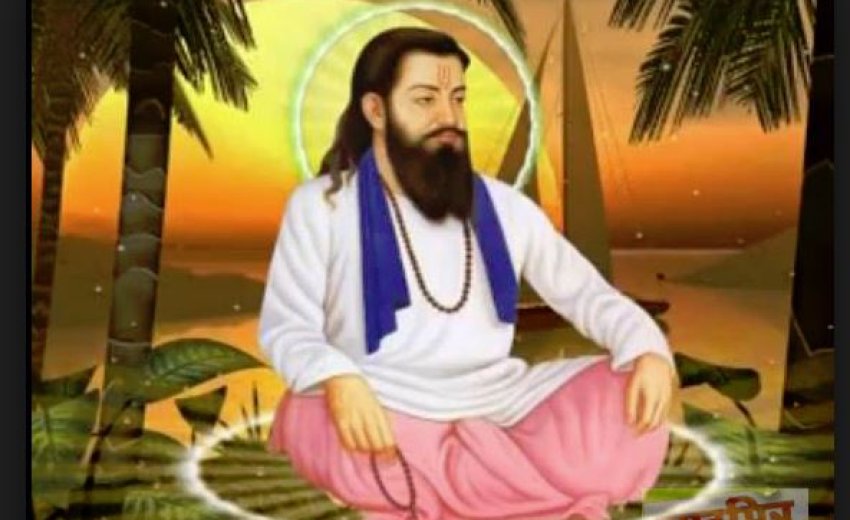 Shri Bhagat Ravidass Ji was born in the fifteenth century at Kanshi (Banara) in the state of Uttar Pradesh in India. His birthday comes every year at Puran Mashi in the month of Magh. His mother's name was Mata Kalsi Ji and his father's name was Baba Santokh Dass Ji.
Shri Bhagat Ravidass Ji was born in the fifteenth century at Kanshi (Banara) in the state of Uttar Pradesh in India. His birthday comes every year at Puran Mashi in the month of Magh. His mother's name was Mata Kalsi Ji and his father's name was Baba Santokh Dass Ji.
Bhagat Ravidass Ji was born in a humble family which was considered untouchable as per the social order prevailing at that time in Hindu society. Guru Ji spearheaded the fight against man-made discrimination based on caste, colour or creed and preached the lofty ideas of socialism, secularism, equality and fraternity.
From very childhood, he was very much devoted to worship Real God. The caste Brahmans created many problems for him. Bhagat Ji had to appear before King Nagarmal so many times. In the end, the King was convinced and became a follower of Bhagat Ravidass Ji.
Bhagat Ravidass Ji taught the lessons of universal brotherhood, tolerance, message of love your neighbour, which got more importance in today's world.
Bhagat Ravidass Ji fulfilled Guru Nanak Dev Ji's request by donating old manuscripts, which contained a collection of Bhagat Ravidass Ji's verses and poems. The earliest collection of these poems are available in Sri Guru Granth Sahib. It was compiled by Guru Arjan Dev Ji, the fifth Guru of the Sikhs. There are 41 verses of Bhagat Ravidass Ji in the Guru Granth Sahib.
It is said that Bhagat Ravidass Ji disappeared from the world, leaving behind only his footprints. Some believe that he lived in banaras during his last days, dying a natural death at the age of 126 years.
Contribution to Sikhism
The 41 hymns of Shri Ravidassji included in the Guru Granth Sahib fall under:
Raga - Siri(1), Gauri (5), Asa(6), Gujari(1), Sorath(7), Dhanasari(3), Jaitsari(1),Suhi(3), Bilaval(2), Gaund(2), Ramkali(1), Maru(2), Kedara(1), Bhairau(1), Basant(1), and Malhar(3). One with slight variations is given in both Rag Sorath and Rag Maru.
Inspite of his low caste, Bhagat Ravidass rose to a position of great honour through a life of simplicity and piety. He never felt ashamed of his pedigree and faced fearlessly the pandits, who were proud of their high caste. He told them the spiritual greatness is achieved through a loving devotion to the Lord. He boldly proclaims,
O people of the city, everyone knows
I am a cobbler by trade and tanner by caste
One of the low caste, and yet within my heart
I meditate upon God.
I am haunted day and night by the thought
Of my low birth, society and deeds
O God! the Lord of the Universe!
O life of my life - forget me not
I am ever Thy slave.
He was such a faithful guru that once he gave a farthing (Damri) to some sadhus, who were going to Hardwar, requesting them to offer it to Ganga Mai on his behalf. They say that when the sadhu presented the damri sent by Bhagat Ravidass, Ganga stretched out her hands to receive it. He was greatly respected during his life time to the extent that even veteran pandits of Kanshi bowed before him. Tradition has it that Queen Jhalan of Mewar became a follower of Ravidass. But despite close contacts with an affluent section of the society, he chose to live austerely.
They say that someone once offered him a paras (the philosopher's stone that turns cheaper metal into Gold) and assured him he could get any amount of wealth by making use of it. Ravidass Ji asked him to place it in a corner. When he came to see Ravidass Ji again after some months, he found the saint still lurking in poverty. He asked him why he had not utilized the paras. Bhagat Ravidass remarked that for him, "God's Name alone was the paras, that was the "kamdhen" and "chintamani".
